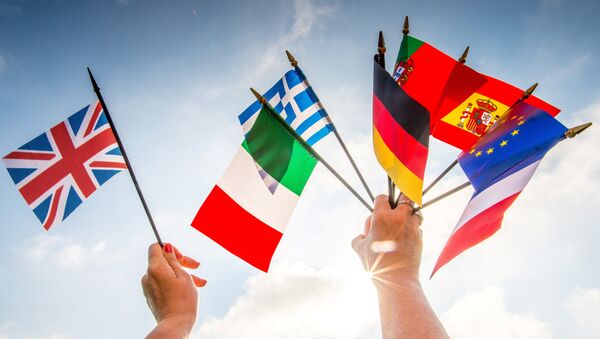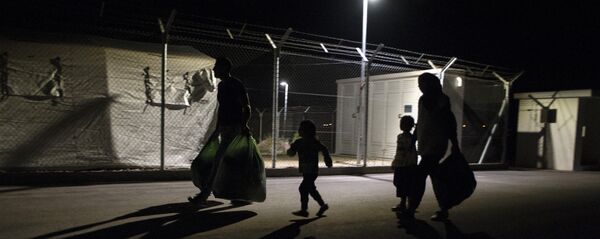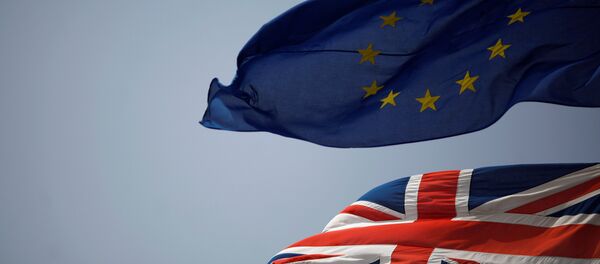MOSCOW (Sputnik) — According to President of the European Council Donald Tusk, the official agenda of the meeting is to push forward reforms within the bloc regarding the protection of external borders, the fight against terrorism and various economic and social issues.
"I have no doubt that the three main challenges are uncontrolled irregular migration, terrorism, and the fears of globalization. My ambition is that in Bratislava we can agree on the main priorities and what we need to do about them in the next few months," Tusk said.
MIGRANTION CRISIS
Europe has been beset by a massive refugee crisis, with hundreds of thousands of undocumented migrants fleeing their crisis-torn countries of origin in the Middle East and North Africa to escape violence and poverty. The majority of them cross the Mediterranean Sea and arrive in the European Union using southern EU nations as transit points. According to the Frontex, about 118,000 people arrived in Europe via the Central Mediterranean route in the first eight months of 2016.
On Tuesday, Luxembourg's Foreign Minister Jean Asselborn urged that Hungary should be suspended or expelled from the European Union, blaming Budapest for challenging EU fundamental values. According to the minister, Hungarian authorities has been violating the freedom of the press and the independence of the judiciary, while sealing borders to counter migrant influx, which is against EU norms.
"We cannot accept that EU’s basic values are being greatly undermined. Those who, like Hungary, build fences to deter war refugees or violate press freedom and judicial independence should be temporarily or, if need be, permanently excluded from the EU," Asselborn said.
FISCAL CRISIS
Despite the best efforts, several European economies, most notably, Greece, Italy and Spain, are struggling and thus ways to help them will be discussed.
According to the International Monetary Fund (IMF), Greek government debt will reach 174 percent of the country’s GDP by the end of the decade.
"The revised projections suggest that debt will be around 174 percent of GDP by 2020, and 167 percent by 2022," the IMF stated. In addition, the fund has lowered its long-term growth assumption for Greece to 1.25 percent.
The Italian public debt reached a historic high in June, exceeding 2.249 trillion euro ($2.518 trillion).
The Spanish government debt in the second quarter of 2016 amounted to 1.106 trillion euro ($1.244 trillion) or 100.5 percent of GDP, the Spanish Central Bank said.
The debt has been growing steadily since 2008 starting from 39.4 percent, then 52.7 in 2009, 90 percent in 2013 and finally 100 percent in March 2016.
INTERNATIONAL TRADE
CETA aims to establish a free trade zone between Canada and the European Union. In 2013, Ottawa and Brussels reached an agreement on key elements of the deal. European critics of CETA claim it would undermine standards and regulations on environmental protection, health and safety and workers' rights.
The deal was signed earlier in 2016 and should come into force in 2017.
BREXIT
The summit will be the first EU leaders' meeting without the United Kingdom in 43 years following Britain's decision to leave the bloc.
On June 23, the United Kingdom held a referendum to decide whether the it should leave or remain in the European Union. According to the final results, 51.9 percent of voters, or 17.4 million people, decided to support Brexit, while about 16.1 million opposed it.
"It is not our intention to talk about the UK in Bratislava, or our negotiation strategy vis-a-vis the UK. Our position is crystal clear: there will be no negotiations without notification," Tusk told reporters, citing the bloc’s founding documents.
German government spokesman Steffen Seibert was less straightforward and said that no momentous decisions were likely to emerge as a result of the Bratislava summit.
"One should not expect any decisions from Bratislava [summit], they are not planned… What should be expected is an intensive dialogue and exchange of views on the fate of the European Union between 27 EU member states," Seibert told reporters.
French President Francois Hollande said that the EU countries need to use the upcoming summit to design a stage-by-stage plan of reforming the European Union following Brexit.
"What we want to do tomorrow is to elaborate the ‘Bratislava plan’, involving working calendar to move forward stage-by-stage and a ‘road map’. … We would like to make the summit useful for Europe… We should give Europeans a clear vision of their future, " Francois Hollande said at a press conference.
JOINT EUROPEAN DEFENSE
Europe is struggling with both heightened terrorism threat and worrying messages from across the pond, stressed by president Juncker that the statements made by the US presidential candidates on the campaign trail show that the US voters are no longer willing to take care of Europe's defense.
French media reported Sunday that French Defense Minister Jean-Yves Le Drian and his German counterpart Ursula von der Leyen had filed a proposal to EU foreign policy chief Federica Mogherini to set up the bloc's collective defense through facilitation of EU collective defense operations, building a common satellite surveillance system and establishing EU joint military headquarters.
However, the issue of creating a joint EU army will not be brought up at the upcoming meeting, a source at the Council of the European Union told Sputnik.
"I do expect the issue of security and defence cooperation to be raised in Bratislava [at the informal meeting on Friday] but this particular initiative [of creating the EU army] will not be discussed in any detail," the source said.
The German Defense Ministry told Sputnik that Defense ministers of the European Union's member states may take first decisions on establishing the bloc’s collective defense at their next official meeting on November 15 in Brussels.
"In late November, the EU defense ministers may take the first decisions on this issue [of boosting common security and defense policy including setting up the joint EU army]," the ministry said.









